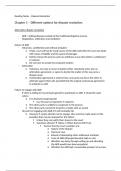Class notes
ULaw reading notes for SQE1 and 2
- Course
- Institution
Need clear, easy-to-follow notes for the SQE? My lecture notes cover all the key topics for SQE1 and SQE2, including FLK, legal skills, and practice areas like contract law, equity and trusts, and criminal litigation.
[Show more]




